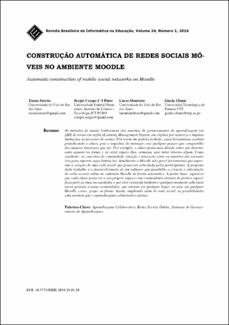| dc.contributor.author | de Clunie, Gisela T. | |
| dc.contributor.author | Serrão, Tássia | |
| dc.contributor.author | Crespo, Sérgio | |
| dc.contributor.author | Braz, Lucas | |
| dc.date.accessioned | 2018-03-13T13:16:57Z | |
| dc.date.available | 2018-03-13T13:16:57Z | |
| dc.date.issued | 01/01/2016 | |
| dc.date.issued | 01/01/2016 | |
| dc.identifier | http://br-ie.org/pub/index.php/rbie/article/view/3151 | |
| dc.identifier.issn | 1414-5685 | |
| dc.identifier.uri | http://ridda2.utp.ac.pa/handle/123456789/4410 | |
| dc.description | The traditional teaching methods of Learning Management Systems (or LMS) are rigid in nature and impose limitations on the teaching process. By having a closed pattern, these tools end up hurting the students, by preventing them from interacting with anyone who shares the same interests. For example, a student posts a question about a particular topic in the forum and sometimes waits days, weeks, without getting any return. As a result, the concepts of community, relationship and interaction between users are required in order to overcome these limitations. Currently Moodle does not provide tools that support the creation of a social network that can be articulated by the participants. The purpose of this study is to develop a software that automatically enables the creation and articulation of online social networking in Moodle. From this, it is expected that each student will be able to have their own space, with virtual communities of practice specific to their needs, and add new people to these communities, that can be anywhere, that is, in any Moodle course, group or forum, extending besides the social networking, the educational possibilities that collaborative learning provides. | en_US |
| dc.description.abstract | The traditional teaching methods of Learning Management Systems (or LMS) are rigid in nature and impose limitations on the teaching process. By having a closed pattern, these tools end up hurting the students, by preventing them from interacting with anyone who shares the same interests. For example, a student posts a question about a particular topic in the forum and sometimes waits days, weeks, without getting any return. As a result, the concepts of community, relationship and interaction between users are required in order to overcome these limitations. Currently Moodle does not provide tools that support the creation of a social network that can be articulated by the participants. The purpose of this study is to develop a software that automatically enables the creation and articulation of online social networking in Moodle. From this, it is expected that each student will be able to have their own space, with virtual communities of practice specific to their needs, and add new people to these communities, that can be anywhere, that is, in any Moodle course, group or forum, extending besides the social networking, the educational possibilities that collaborative learning provides. | en_US |
| dc.format | application/pdf | |
| dc.language | eng | |
| dc.language.iso | eng | en_US |
| dc.rights | https://creativecommons.org/licenses/by-nc-sa/4.0/ | |
| dc.rights | info:eu-repo/semantics/openAccess | |
| dc.subject | Collaborative Learning | en_US |
| dc.subject | Online Social Networking | en_US |
| dc.subject | Learning Management Systems | en_US |
| dc.subject | Collaborative Learning | |
| dc.subject | Online Social Networking | |
| dc.subject | Learning Management Systems | |
| dc.title | Automatic construction of mobile social networks on Moodle | en_US |
| dc.type | info:eu-repo/semantics/article | |
| dc.type | info:eu-repo/semantics/publishedVersion | |
